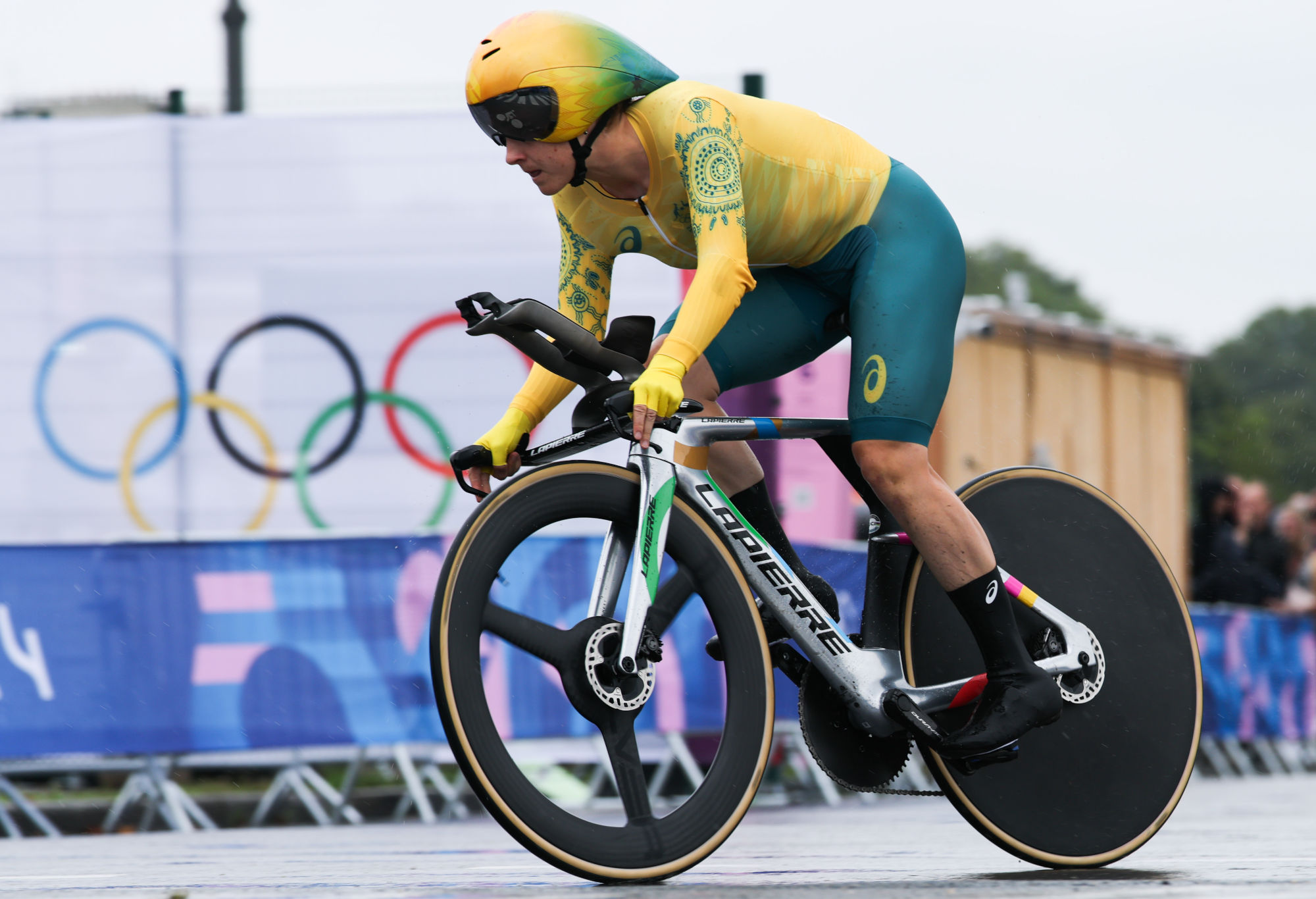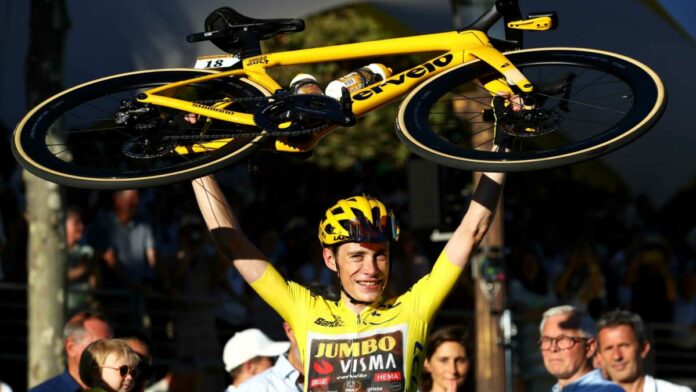A
Set small text size
A
Set the default text size
A
Set large text size
1. Pogacar breaks Merckx’s Tour de France records
Eddy Merckx has long been regarded as the greatest cyclist of all time. The ‘Cannibal’ has Palmares that beggar belief: five Tour de France wins, five Giro d’Italias, a Vuelta, Triple World Champion and winner of each of the five Monuments. There are some records that even cycling royalty like Tadej Pogacar may never come near – 19 Monument wins, 525 total wins, 54 wins in a single season (1971) – but his five Tour de France victories and 34 stage victories could be vulnerable to this generation’s most dominant stage racer.
Pogacar is just 26 and already boasts three Maillot Jaunes and 17 stages. Entering cycling’s recognised prime years, he is almost without peer. Only Jonas Vingegaard has shown any ability to keep up with the Slovenian star on the biggest stage, but he struggled to keep up with Pogacar in the mountains last year, although his preparation was heavily interrupted.
Jonas Vingegaard. (Photo by Michael Steele/Getty Images)
Pogacar might not settle for just those noteworthy Merckx records either – with the right course, he might aim to become just the second man after the Belgian legend (1969) to win the overall, points and mountains classifications at the Tour de France. If he could achieve that, he would truly be able to call himself Merckx’s equal on the roads of France.
2. An explosion of African talent
How many cycling fans thought a plucky young Eritrean would become a multi-Grand Tour stage winner and Green Jersey winner in 2024? Biniam Girmay exploded onto the scene last season with three stages at the Tour, delivering on the promising 2023 season that saw him storm to victory on Stage 10 of the Giro d’Italia before a self-inflicted injury celebrating ruled him out of the race.
Girmay’s success is sure to have two effects: young talent in Africa are more likely to believe they can succeed in the historically European-centric sport, and teams are likely to look to untapped potential in Africa for their next stars. There’s already a growing number of East Africans on the World Tour, with Daniel Teklehaimanot, Natnael Tesfatsion, Tsgabu Grmay and Amanuel Ghebreigzabhier all riding in recent years.
Cyclists and endurance athletes often benefit from living in higher altitudes – professional teams conduct regular altitude camps to condition their riders – and nations like Eritrea, Ethiopia and Kenya have a rich history of producing excellent endurance athletes in part due to their elevation. Cycling teams have already tapped into the extensive pool of talent in mountainous Colombia and Ecuador, so it would come as no surprise if they turn to identifying athletes in the East African highlands for their next set of climbing superstars.
3. The rich get richer, the bottom end falls away
It’s no secret that unless you’re at the top of the sport, cycling can be gruelling without much of the financial upside seen in other sports. While the likes of Pogacar, Remco Evenepoel and Mathieu van der Poel rake in millions in salaries and endorsements, there isn’t the same comparative level of princely compensation for being in the world’s top 200 riders as there would be for the top 200 in football, basketball or cricket.
This extends to the teams – outside the top dozen or so teams with major backing (e.g., UAE Team Emirates, INEOS, Lidl-Trek) money is constantly tight. With sponsors coming and going regularly, with smaller teams cramming as many as they can onto jerseys to maximise their funds, the ability to forward plan is limited for most teams. Riders and staff are on short deals, never knowing if their team will get enough cash to continue the next season. It’s not been uncommon for even World Tour teams to fold – the situation is always worse further down the tour.
The top teams with their stars will always be able to bring sponsors to the table, but with cycling going behind a paywall in the UK and attracting limited broadcasting deals with increased competition for eyeballs from other sports and streaming, the distribution of funding is likely to become more top-heavy.
4. A Grand Tour departs from Arabia
The Tour de France is no stranger to starting abroad – it’s started a dozen times in the Netherlands and Belgium, while also starting further afield in the likes of Denmark, Ireland and Germany. The Giro d’Italia has begun in countries including Hungary, Israel and this year will kick off in Albania – the major tours are no stranger to unique beginnings.
Whilst logistically, a start in the Middle East would be a harder sell to riders and teams than Spain, Switzerland or a prologue in Monaco, cycling is not immune to immense piles of cash. The Tour and much of cycling’s races generate profit in part through bids by regions and cities to pass through them – the eyeballs on races can be a good tourism generator and some smaller towns have become globally known amongst cycling fans as a result of their regular appearances. Who has more money to throw at organisers than anyone else?
The Arabian states already have a huge presence in the sport – Jayco AlUla (Saudi Arabia), Team UAE Emirates (UAE) and Bahrain Victories (Bahrain) are amongst the top funded teams. Whilst it’s likely to be too hot in July for the Tour de France to begin in Arabia, it’s not out of the question. More likely is that either the Giro d’Italia or the Vuelta a España accepts an offer to begin hundreds of kilometres from their homelands.
5. An Australian Tour de France winner

Grace Brown won gold for Australia in road cycling. (Photo by Jan Woitas/picture alliance via Getty Images)
The competition might be too hot in the men’s, with Pogacar likely to still be dominant for much of the next decade. Much like Australia’s football teams, swimming squads and athletics champions, however, we can always rely on our sporting women. The Dutch have dominated the women’s cycling scene for a while now – Demi Vollering has picked up where Annemiek van Vleuten and Anna van der Breggen left off – but the recently retired Grace Brown’s Olympic gold proves there’s plenty of talent in the Aussie ranks.
Australia has a rich history in track cycling to draw on – decades of talented cyclists competing in green and gold. As the profile of the World Tour in women’s cycling continues to rise and the prestige of the Tour de France Femmes explodes, it wouldn’t be surprising to see more promising cyclists set their goals on conquering the French Alps and writing a new chapter in Aussie cycling history.
Who could bring the Maillot Jaune home for Australia is unknown, but the allure of being our first women’s champion would surely be enough to have the best talent clambering for the chance to cement themselves in the history books.
Source link : http://www.bing.com/news/apiclick.aspx?ref=FexRss&aid=&tid=67b62ba7177e4b3baf528916b016d0b2&url=https%3A%2F%2Fwww.theroar.com.au%2F2025%2F02%2F20%2Fbold-predictions-for-the-next-decade-in-cycling-pogacar-bests-merckx-africas-time-to-shine%2F&c=15792277468696251341&mkt=de-de
Author :
Publish date : 2025-02-19 08:01:00
Copyright for syndicated content belongs to the linked Source.



















































